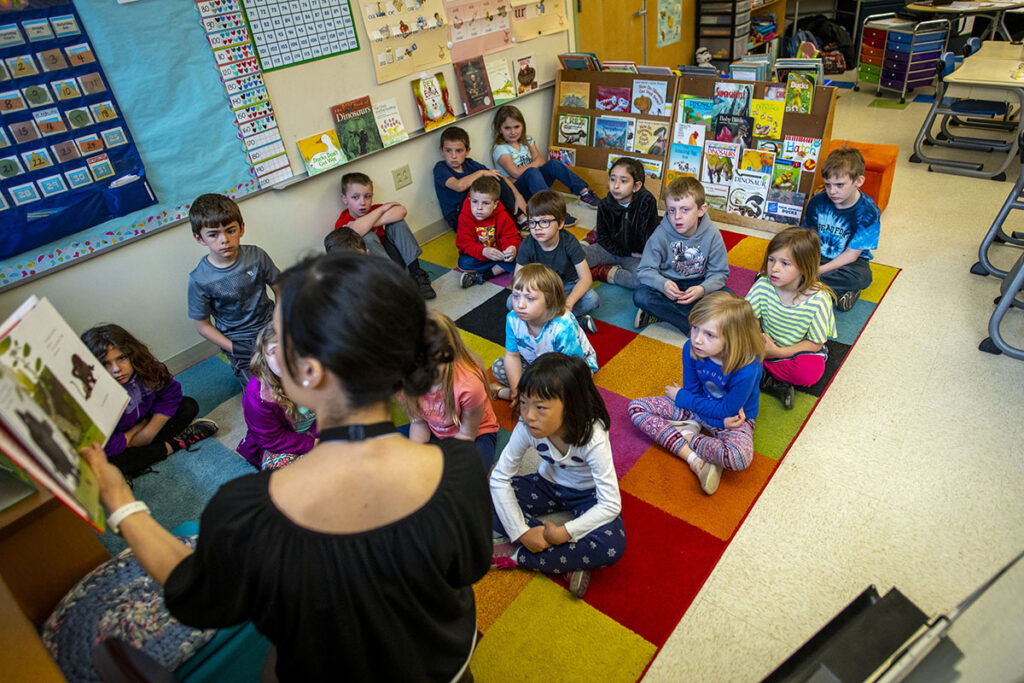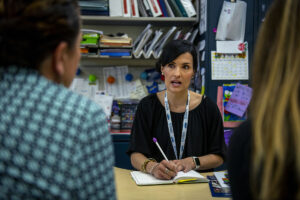Literacy Coaches

An essential element of the MPCL model is the training of literacy coaches. The University of Maine is a NECHE-accredited university, where teachers can enroll in a specialized program of study and earn a certificate as a school-based literacy coach.
The program of study meets the 2017 International Literacy Association (ILA) Standards for the Preparation of Literacy Professionals in seven critical areas: (1) foundational knowledge; (2) curriculum and instruction; (3) assessment and evaluation; (4) diversity and equity; (5) learners and literacy environment; (6) professional learning and leadership; and (7) practicum/clinical experiences.
Standard 1. Foundational Knowledge
Candidates demonstrate knowledge of the theoretical, historical, and evidence-based foundations of literacy and language and the ways in which they interrelate and the role of literacy professionals in schools.
Standard 2. Curriculum and Instruction
Candidates use foundational knowledge to critique and implement literacy curricula to meet the needs of all learners and to design, implement, and evaluate evidence-based literacy instruction for all learners.
Standard 3. Assessment and Evaluation
Candidates understand, select, and use valid, reliable, fair, and appropriate assessment tools to screen, diagnose, and measure student literacy achievement; inform instruction and evaluate interventions; participate in professional learning experiences; explain assessment results and advocate for appropriate literacy practices to relevant stakeholders.
Standard 4. Diversity and Equity
Candidates demonstrate knowledge of research, relevant theories, pedagogies, essential concepts of diversity and equity; demonstrate and provide opportunities for understanding all forms of diversity as central to students’ identities; create classrooms and schools that are inclusive and affirming; advocate for equity at school, district, and community levels.
Standard 5. Learners and Literacy Environment
Candidates meet the developmental needs of all learners and collaborate with school personnel to use a variety of print and digital materials to engage and motivate all learners; integrate digital technologies in appropriate, safe, and effective ways; foster a positive climate that supports a literacy-rich learning environment.
Standard 6. Professional Learning and Leadership
Candidates recognize the importance of, demonstrate, and facilitate professional learning and leadership as a career-long effort and responsibility.
Standard 7. Practicum/Clinical Experiences
Candidates apply theory and best practice in multiple supervised practicum/clinical experiences.
Using a cognitive apprenticeship model, school-based literacy coaches work in a school or system setting during their training year. The MPCL Trainer conducts school visits during the training year to observe and support the coach in all aspects of the coaching role.
 Who is the MPCL school-based literacy coach?
Who is the MPCL school-based literacy coach?
Criteria for Selecting a School-based Literacy Coach
A teacher applying for the Maine Partnerships in Comprehensive Literacy school-based literacy coach internship must have:
- A Maine Teaching Certificate for Grades in which the coach supports teachers
- A minimum of three years of teaching experience in grades K-12
- A minimum of a master’s degree
Selecting a School-based Literacy Coach For Your School
The school-based literacy coach plays an essential role in the successful implementation of higher levels of teaching and learning. Therefore, thoughtful consideration in the selection of this person is vital.
The person filling the role of school-based literacy leader must be committed to assisting the school as it moves through the change process. Since systematic change takes years to accomplish, it is in the interest of the school to support a person who intends to work at the school for at least five years. Additionally, the person must have the respect of colleagues and be able to serve as a leader. The following questions can help guide the school in selecting a school-based literacy coach.
- Does the candidate communicate clearly and effectively?
- Is the candidate flexible?
- Is the candidate open to change and new ideas?
- Is the candidate a life-long learner?
- Is the candidate a reflective and critical thinker?
- Does the candidate have the ability to work with different types of people?
- Is the candidate a collaborator?
- Is the candidate organized?
- Is the candidate an effective teacher?
- Is the candidate a lifelong learner?
- Does the candidate understand teaching and learning?
- Is the candidate a school leader?
- Is the candidate able to receive constructive feedback?
The school-based literacy coach is a key change agent who assures that the school attains its goal of improved student achievement through ongoing professional development for educators and leadership teams. This person is a catalyst for school change.
 The Responsibilities of a School-Based Literacy Coach
The Responsibilities of a School-Based Literacy Coach
During the training year, the school-based literacy coach:
- Teaches daily in a classroom using the Comprehensive Literacy Framework within a Workshop Model
- Attends 32 training days across the calendar year
- Attends 7 days for follow-up support after the initial internship year
- Organizes and participates in collaborative learning team meetings at his/her school
- Video-records and analyzes his/her teaching during literacy lessons
- Collects baseline school data
- Provides awareness presentations to introduce others in the school to MPCL
In the year following the internship, the school-based literacy coach:
- Teaches in a classroom using the Comprehensive Literacy Framework
- Teaches an on-site PCL course-of-study for faculty
- Demonstrates lessons and coaches teachers in classrooms
- Engages in coaching cycles with individuals or teacher teams
- Participates in collaborative learning team meetings
- Provides professional development
- Attends 7 days of professional development at the University of Maine
- Collects, analyzes, and reports on school data
In subsequent years, the school-based literacy coach:
- Coaches in classrooms using the Comprehensive Literacy Framework
- Provides continued on-site professional development classes for teachers
- Engages in classroom demonstration lessons and coaching with the classroom teacher
- Engages in coaching cycles with individuals or teacher teams
- Teaches the initial course for teachers new to the school
- Participates in collaborative learning team meetings
- Provides professional development
- Attends 7 days of professional development at the University of Maine
- Collects, analyzes, and reports on school data
